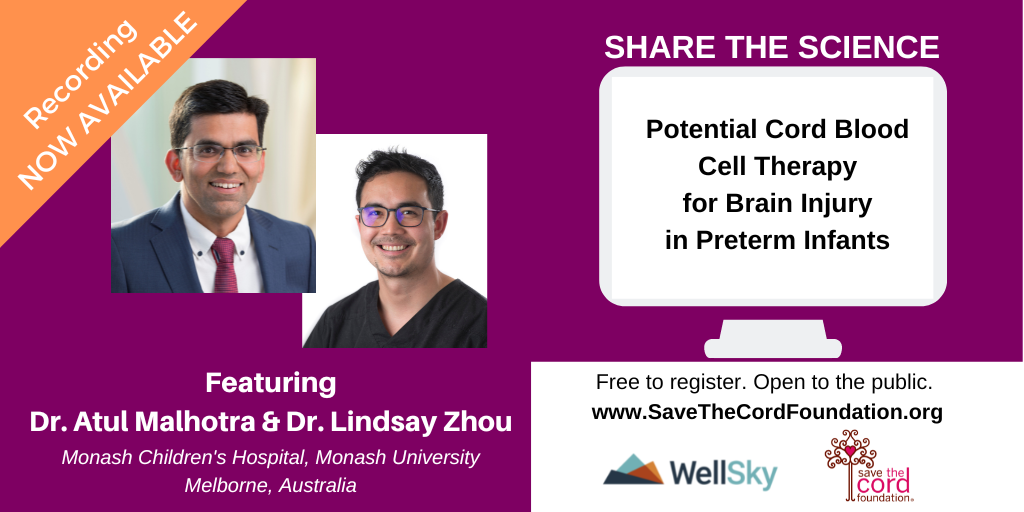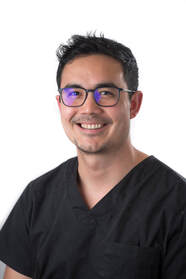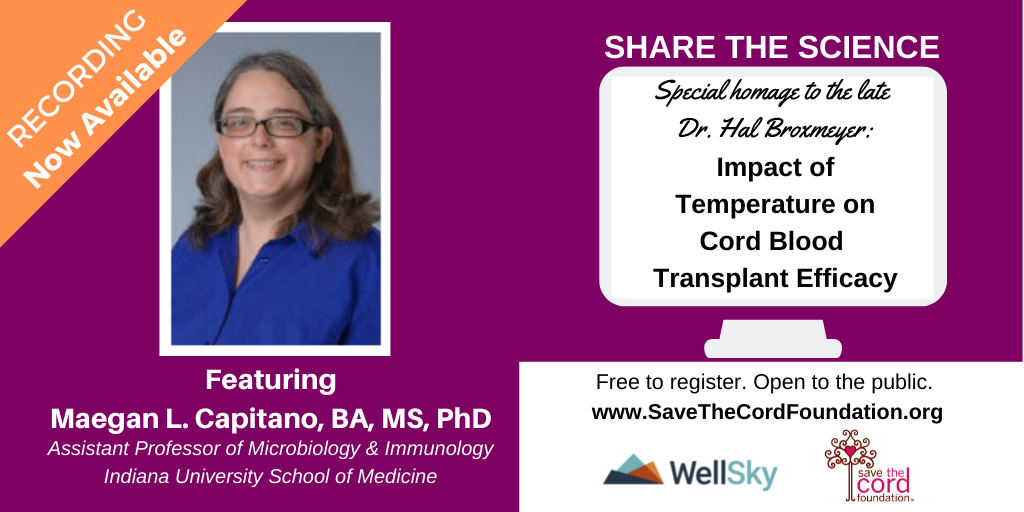Share the Science: Drs. Malhotra & Zhou - Potential Cord Blood Cell Therapy for Preterm Brain Injury8/4/2022
Save the Cord Foundation and WellSky are proud to welcome Dr. Atul Malhotra and Dr. Lindsay Zhou as our featured speakers for the next edition of Share the Science on Wednesday, August 17th, 2022 at 5pm US Eastern Time / 4pm US Central Time. Join us to hear Dr. Malhotra and Dr. Zhou discuss their research on the potential use of cord blood in cell therapy to treat brain injury in preterm infants. RECORDING NOW AVAILABLE (watch via the Share the Science archive) Share the Science is a free webinar series focused on the cord blood industry and the latest research in this field. As always, we invite both health professionals and the general public to join us for this unique online educational series. Learn more about this exciting educational series here. Cell Therapy for Brain Injury: |
| Dr. Atul Malhotra Senior Consultant Neonatologist and Head of the Early Neurodevelopment Clinic at Monash Children's Hospital and Associate Professor (Research) & NHMRC Fellow in the Department of Paediatrics, Monash University. Associate Professor Atul Malhotra is a Senior Consultant Neonatologist and Head of the Early Neurodevelopment Clinic at Monash Children's Hospital and Associate Professor (Research) & NHMRC Fellow in the Department of Paediatrics, Monash University. He has published over 120 peer-reviewed journal articles, 4 book chapters and his research has attracted over $7.5 million of funding to date. He is also the co-Director of the Newborn Cell Therapies Group at Monash, which has been instrumental in the translation of preclinical therapies from the laboratory to the clinic, including regenerative cell therapies. He led a world-first trial of placental amnion epithelial cells for chronic lung disease of prematurity, and is the Principal Investigator of two cord blood derived cell therapy trials currently recruiting. |
| Dr. Lindsay Zhou Consultant Neonatologist at Monash Children's Hospital and a PhD student at the Ritchie Centre and Department of Paediatrics, Monash University. Dr Lindsay Zhou is a Consultant Neonatologist at Monash Children's Hospital and a PhD student at the Ritchie Centre and Department of Paediatrics, Monash University. Dr. Zhou undertook his paediatric and neonatal training in Melbourne, and also works as a Retrieval Consultant at the Royal Children's Hospital Melbourne. His PhD studies focus on umbilical cord-blood derived cell therapy applications for extremely preterm infants. He is an Associate Investigator on the CordSaFe clinical trial, investigating the safety and feasibility of umbilical cord blood-derived cell collection and administration in infants born at less than 28 weeks. |
Share the Science and sharing their valuable insight
on the potential of using cord blood in cell therapy to treat preterm brain injury in enfants.
We also wish to also thank our generous sponsor and partner for this event,
WellSky Health, who continue to support cord blood
education through our “Share the Science” series.
Share the Science: Dr. Mitchell Horwitz - Improved Clinical Outcomes in Cord Blood Transplantation
6/13/2022
Share the Science is a free webinar series focused on the cord blood industry and the latest research in this field. As always, we invite both health professionals and the general public to join us for this unique online educational series. Learn more about this exciting educational series here.
Looking to the future of cord blood transplantation
In this spirit, Dr. Mitchell Horwitz and his team at Duke University Medical Center have led the way in new and pioneering cord blood research. Recently, the team published their encouraging results from a phase 3 randomized study on the efficacy of omidubicel vs. standards myeloablative umbilical cord blood transplantation. Omidubicel is an ex vivo expanded hematopoietic progenitor cell and non-expanded myeloid and lymphoid cell product that is derived from a single umbilical cord blood unit.
As part of Dr. Horwitz' study, between January 2017 and January 2020, 125 patients ages 13 to 65 years with hematologic malignancies were randomly assigned to this study. Patients received myeloablative conditioning and prophylaxis with a calcineurin inhibitor and mycophenolate mofetil for graft-versus-host disease.
Join us to learn about the details of this phase 3 study and explore ways that doctors can improve cord blood transplants through innovation.
with
Mitchell Horwitz, MD
Adult Blood and Marrow Transplant Program and Professor of Medicine at the Duke University Medical Center
"Improved Clinical Outcomes with Omidubicel vs. Standard Myeloablative Umbilical Cord Blood Transplantation"
Free webinar. Open to the public.
Wednesday, June 22nd, 2022 1pm ET
RECORDING NOW AVAILABLE in the Share the Science Archive
About the speaker
| Mitchell Horwitz, M.D. Adult Blood and Marrow Transplant Program and Professor of Medicine at the Duke University Medical Center With over 20 years of experience, Dr. Horwitz specializes in allogeneic stem cell transplantation using umbilical cord blood grafts; allogenic stem cell transplantation for Sickle Cell Disease; prevention of acute graft versus host disease through donor stem cell graft manipulation; and improving immune recovery following alternative donor stem cell transplantation using donor graft manipulation or third party thymus transplantation. |
Share the Science and sharing his valuable insight
on the ways to improve cord blood transplantation.
We also wish to also thank our generous sponsor and partner for this event,
WellSky Health, who continue to support cord blood
education through our “Share the Science” series.
Share the Science is a free webinar series focused on the cord blood industry and the latest research in this field. As always, we invite both health professionals and the general public to join us for this unique online educational series. Learn more about this exciting educational series here.
How does temperature affect cord blood transplants? It starts at birth.
| The legacy of Dr. Hal Broxmeyer is felt strongly by his colleagues and the cord blood industry at large. He rightfully earned the title, "Father of Cord Blood." While his passing in 2021 left us with a true sense of loss, we are forever grateful to him and his colleagues for the innovative work they have done over the years and, in particular, Dr. Broxmeyer's discovery regarding the ability to collect and store cord blood for future use in stem cell transplants, if prepared and frozen promptly after the birth of a child. Given this, it does seem appropriate that one of his last research projects was related to temperature. He and his team sought to answer. . . How does temperature affect the quality of collections and processing of cord blood for stem cell transplants? To answer this question and dive deep into this research led by Broxmeyer's lab, we have invited Dr. Maegan Capitano to speak on Share the Science. As the Assistant Professor of Microbiology & Immunology at the Indiana University School of Medicine, Dr. Capitanto will go in-depth on her latest research undertaken with Dr. Broxmeyer regarding how collecting and processing human cord blood at 4°C within minutes of the baby's birth results in significantly enhanced numbers of rigorously defined phenotypic and functional hematopoietic stem cells. During this session, Dr. Capitano will discuss a variety of studies from the late Dr. Hal Broxmeyer that show how hematopoietic stem cell numbers collected in cord blood at the birth of a baby is a limiting factor for efficacious use of cord blood in hematopoietic cell transplantation. We are honoured to have Dr. Capitano join us for this very special edition of Share the Science. Please join us and learn more about this group's amazing work in the world of cord blood. |
with
Maegan L. Capitano, BA, MS, PhD
Assistant Professor of Microbiology & Immunology, Indiana University School of Medicine
"Impact of Temperature on Cord Blood Transplant Efficacy"
Free webinar. Open to the public.
Tuesday, April 12 at 2 pm ET / 11 am PT
RECORDING NOW AVAILABLE - WATCH HERE
About the speaker
| Maegan L. Capitano, BA, MS, PhD Assistant Professor of Microbiology & Immunology, Indiana University School of Medicine Associate Member, Indiana University Simon Comprehensive Cancer Center Member and Hypoxia Core Director, Indiana University NIDDK-designated Cooperative Center of Excellence in Hematology Maegan L. Capitano earned her B.A. in Biology from St. Mary’s College of Maryland in 2004. During her summers in college, she worked at Memorial Sloan Kettering Cancer Center in the laboratory of Dr. Bo Dupont as a laboratory technician where she developed a passion for research. She next went on to earn a M.S. in Natural Science-Oncology in 2006 and her Ph.D. in Microbiology and Immunology in 2012 at the State University of New York at Buffalo- Roswell Park Cancer Center Division under the mentorship of Dr. Elizabeth Repasky. There she was given the George Meyer’s Award for Proficiency and Academic Excellence in Immunology. She received her post-doctoral training (2012-2020) and worked as an Assistant Research Professor in the laboratory of Dr. Hal Broxmeyer at Indiana University School of Medicine focusing on Experimental Hematology. In 2021, she joined the faculty of the Department of Microbiology and Immunology at Indiana University School of Medicine as an Assistant Professor. Dr. Capitano’s research focuses on discovering potential new agents that regulate hematopoietic stem and progenitor cell migration, proliferation, differentiation, and survival capacity under normal and stressed conditions. The Capitano lab strives to discover novel methods to 1) improve collection of donor cells for transplant so that the pool of eligible donors is increased and to 2) enhance the efficacy of donor cell engraftment thus shortening the hospitalization/isolation time of patients and subsequently decreasing treatment costs. |
Share the Science and sharing her valuable insight
on the efficient collection and processing of cord blood.
We also wish to also thank our generous sponsor and partner for this event,
WellSky Health, who continue to support cord blood
education through our “Share the Science” series.
Author
Write something about yourself. No need to be fancy, just an overview.
Archives
December 2023
March 2023
February 2023
August 2022
June 2022
April 2022
December 2021
July 2021
June 2021
May 2021
January 2021
October 2020
September 2020
August 2020
June 2020
May 2020
March 2020
October 2019
August 2019
May 2019
April 2019
March 2019
February 2019
November 2018
August 2018
January 2018
October 2017
September 2017
June 2017
May 2017
April 2017
March 2017
February 2017
January 2017
December 2016
November 2016
October 2016
September 2016
August 2016
June 2016
March 2016
January 2016
December 2015
November 2015













 RSS Feed
RSS Feed


